The Best Way to Remove Hard Water Stains
When you tackle hard water stains, you might find the process frustrating, but it doesn't have to be. Using simple household items like vinegar and baking soda can make a significant difference. You'll want to start by mixing equal parts of vinegar and water and applying it to the stains. But that's just the beginning; there are specific techniques and preventive measures that can enhance your results. Curious about the best methods to guarantee your surfaces stay pristine and stain-free? Let's explore the most effective strategies together.
Understanding Hard Water Stains
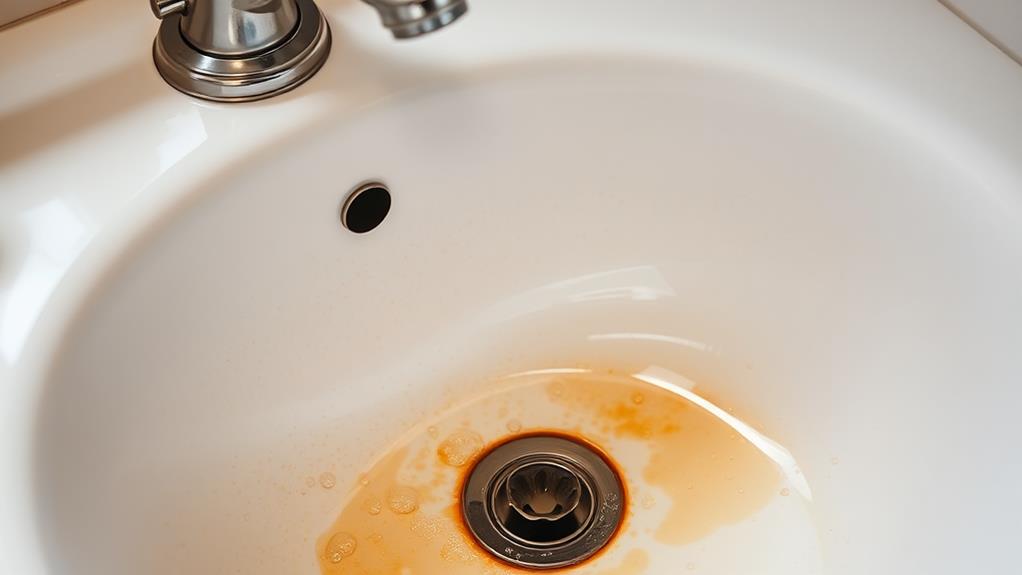
Hard water stains can be a frustrating sight in your home. These pesky marks form when water with high levels of minerals, like calcium and magnesium, evaporates, leaving behind white or cloudy deposits on surfaces.
You might notice them on glass, tiles, faucets, or sinks, where they can build up over time and become stubborn stains. Not only do they look unappealing, but they can also create issues with your plumbing, reducing water pressure and damaging fixtures.
To prevent hard water stains, regular cleaning is key. The longer you let these stains sit, the harder they're to remove! You don't want to turn your cleaning routine into a battle against tough stains.
Luckily, understanding hard water and its effects can help you pick the right cleaning methods. For example, vinegar is a fantastic natural solution. It can cut through those mineral deposits like a champ!
Effective Cleaning Solutions
When it comes to tackling hard water stains, you've got some excellent cleaning solutions at your disposal.
First up is vinegar, a natural cleaner that really packs a punch. Mix equal parts vinegar and water in a spray bottle, let it sit for 15 minutes, and watch those stains dissolve.
If you want to go even further, combine vinegar with baking soda to create a powerful paste. This duo scrubs away mineral deposits without scratching your glass surfaces.
If you're dealing with stubborn stains, grab some hydrogen peroxide. Apply it directly to the affected areas, let it sit for 15 minutes, then scrub. You'll be amazed at the results!
For a zesty twist, lemon juice is also great. Just apply it to the stains, and its natural acidity will help break down those pesky mineral deposits.
Of course, if you prefer something pre-made, there are commercial cleaning solutions specifically designed for hard water stains, like CLR Pro Spray Cleaner.
With these cleaning solutions in your toolkit, those hard water stains won't stand a chance!
Cleaning Techniques for Surfaces
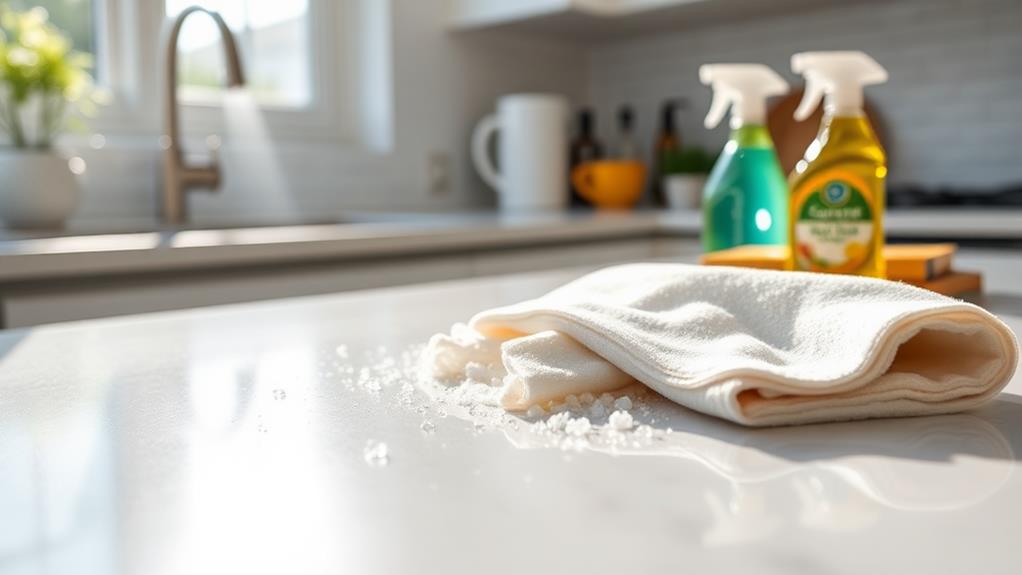
Effective cleaning techniques can make all the difference in removing hard water stains from various surfaces. To tackle those stubborn stains, start with glass surfaces.
Mix equal parts water and vinegar in a spray bottle, spray it on the stains, let it sit for 30 minutes, and then scrub with a sponge. If some stains refuse to budge, a baking soda paste can work wonders too!
For tiles, sprinkle baking soda on the stained areas and spray with vinegar. Give it a little scrub with a brush, and rinse thoroughly for that sparkling finish.
When it comes to faucets, soak a cloth in vinegar, wrap it around the area, let it sit for a few minutes, then scrub and rinse – it's that easy!
For sinks and bathtubs, simply apply a baking soda paste, let it sit for a few minutes, scrub away, and rinse with hot water.
Finally, don't forget about showerheads! Soak them in vinegar overnight to dissolve those pesky mineral deposits.
With these handy techniques, you'll be well on your way to cleaning hard water stains like a pro!
Preventive Measures
Preventing hard water stains is easier than you might think. First, make it a habit to wipe down surfaces after they've been exposed to water. This simple step can stop mineral deposits from drying and forming those pesky stains.
Want to take it a step further? Consider investing in a water softener. It removes minerals like calcium and magnesium from your water supply, making hard water issues a thing of the past.
Next, set up a consistent cleaning routine. Using natural cleaners, like vinegar and baking soda, can help prevent that buildup over time. These natural options aren't only effective but also kinder to the environment.
Don't forget to apply sealants to porous surfaces, such as granite or grout. Sealants protect against hard water stains and make cleaning much easier.
Lastly, keep a squeegee handy! After showering, just give your glass surfaces a quick swipe. This will stop mineral deposits from accumulating and keep everything looking clear and shiny.
With these preventive measures, you'll be well on your way to a home free of hard water stains!
Vinegar as a Cleaning Agent
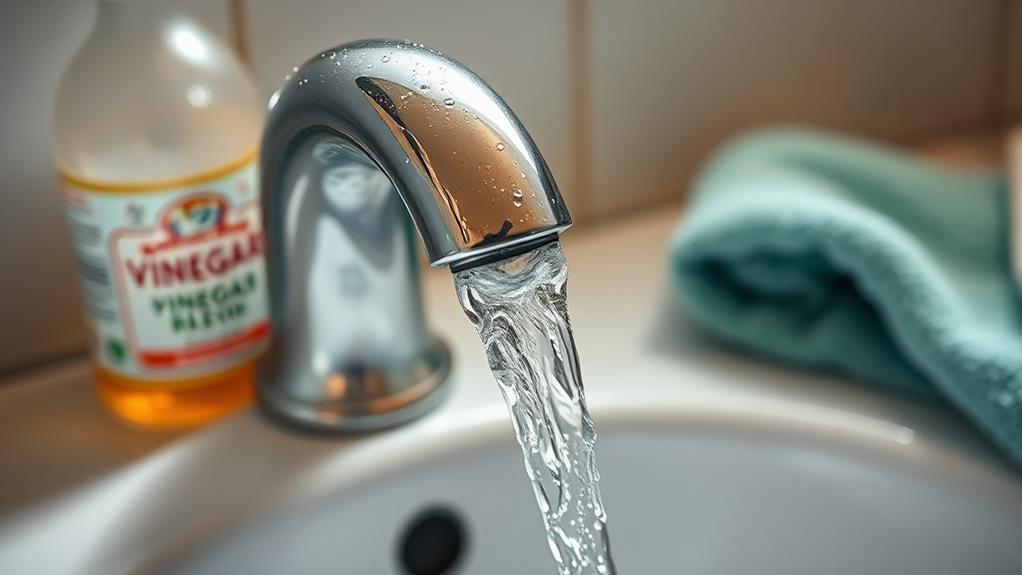
Harnessing the power of vinegar can transform your cleaning routine, especially when tackling hard water stains. This natural cleaning agent is a superstar at breaking down those pesky mineral deposits like calcium and magnesium.
To get started, mix equal parts water and vinegar in a spray bottle. Give it a good shake, then spray the stained surface generously. Let it sit for about 5 to 15 minutes. This waiting time helps the vinegar's strong acidity do its magic.
For those vertical surfaces, soak some paper towels in vinegar and stick them on the stain. This keeps the area damp and allows the vinegar to penetrate better. After the time's up, simply wipe clean with a soft cloth or sponge. You'll be amazed at how easily those hard water stains vanish!
And if you want to amplify your cleaning power, you can even combine vinegar with baking soda for a super cleaning duo.
Just remember, while apple cider vinegar is nice and all, white vinegar is your best bet for cleaning due to its stronger punch. So, grab that vinegar and get cleaning—you've got this!
Baking Soda's Role
While vinegar is a fantastic option for tackling hard water stains, baking soda also plays a significant role in your cleaning arsenal. This miracle worker acts as a mild abrasive, making it perfect for scrubbing away those pesky stains without scratching your surfaces.
Simply mix baking soda with water to create a paste, and you've got a powerful cleaner ready to dissolve mineral deposits. When you apply this paste to stained areas, like ceramic tile and sinks, you'll notice how easily those hard water stains come off.
Plus, baking soda is non-toxic, so it's safe to use in kitchens and bathrooms where hygiene is key.
Want to amp up your cleaning game? Combine baking soda with vinegar! The bubbly reaction between them helps lift stains even better.
Regularly using baking soda in your cleaning routine can prevent hard water stains from coming back. Keeping your fixtures and surfaces looking fresh is a win-win!
Benefits of Water Softeners
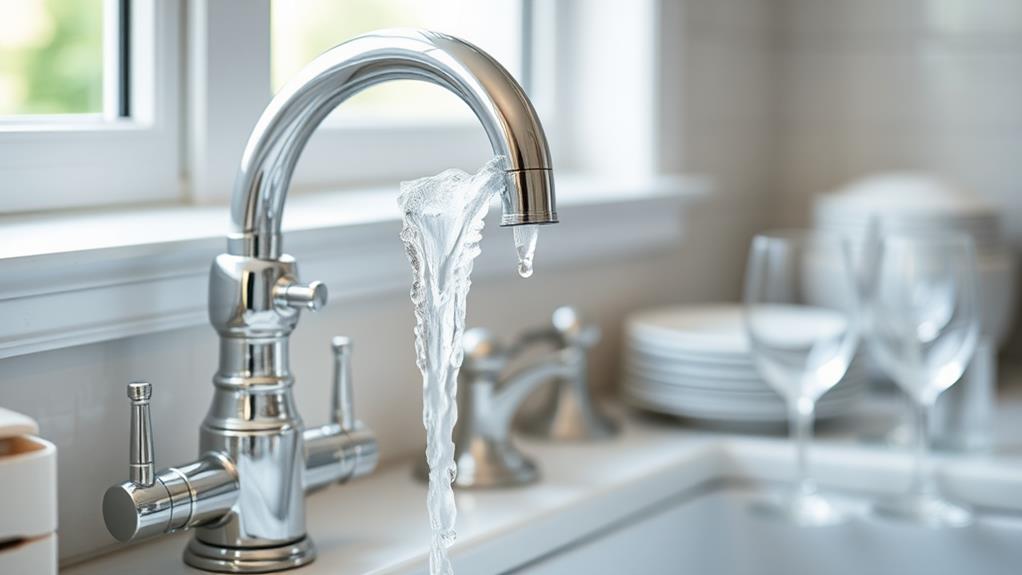
If you're tired of dealing with hard water stains and the damage they cause, investing in a water softener can be a game changer. Water softeners work by removing calcium and magnesium from your water, which helps reduce mineral content. This means fewer hard water stains on your fixtures and surfaces, leaving your home looking cleaner and brighter.
Not only do water softeners help your plumbing systems last longer, but they also boost the efficiency of appliances like water heaters and dishwashers. You won't believe how much better your laundry will look! Soft water prevents dingy clothes and reduces soap scum buildup in washing machines, so your favorite outfits stay looking fresh.
Plus, many households notice softer skin and hair after switching to soft water. Hard water can strip away natural oils, but soft water keeps those intact, making your skin feel great and your hair shine.
You'll also find you spend less on cleaning products since soft water makes it easier to clean. Investing in a water softening system not only saves you money in the long run but also makes your home feel like a spa!
Additional Tips and Tricks
Investing in a water softener can greatly reduce hard water stains, but you can enhance your cleaning efforts with some additional tips and tricks. For those stubborn hard water stains, mix vinegar and baking soda to create a powerful cleaning paste. This combo breaks down mineral deposits like a champ!
Grab a toothbrush or small scrub brush to reach those hard-to-access spots—trust me, your surfaces will thank you.
After scrubbing, make sure you rinse surfaces thoroughly to wash away any residue from your cleaning agents. Residue can attract more dirt, leading to even more hard water build-up.
To prevent future stains, consider using distilled water for cleaning. It has fewer minerals compared to tap water, making it a smarter choice.
And don't forget about regular maintenance! Staying consistent with your cleaning routine can greatly reduce hard water stains over time.
Common Mistakes to Avoid
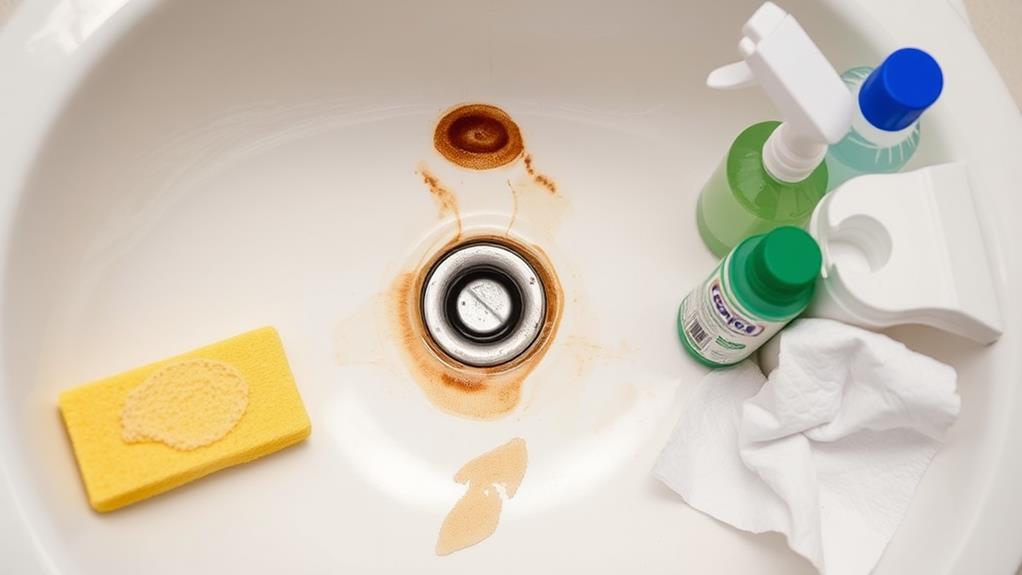
When tackling hard water stains, there are several common mistakes you should steer clear of to guarantee your cleaning efforts are effective.
First, avoid using abrasive cleaners or scrubbers on delicate surfaces. They can scratch and damage more than they clean. Instead, choose a gentle hard water stain remover.
Another mistake isn't letting cleaning solutions sit for the recommended time. If you don't, they won't break down those tough mineral deposits.
And please, test any cleaning solutions on a small, hidden area before applying them fully. You don't want to risk discoloration!
After you clean, make sure to rinse thoroughly. Leaving behind residue from cleaning products can attract more dirt, leading to future stains. Yikes!
Lastly, don't ignore regular maintenance and cleaning routines. If you let those hard water stains build up, they'll become much harder to remove.
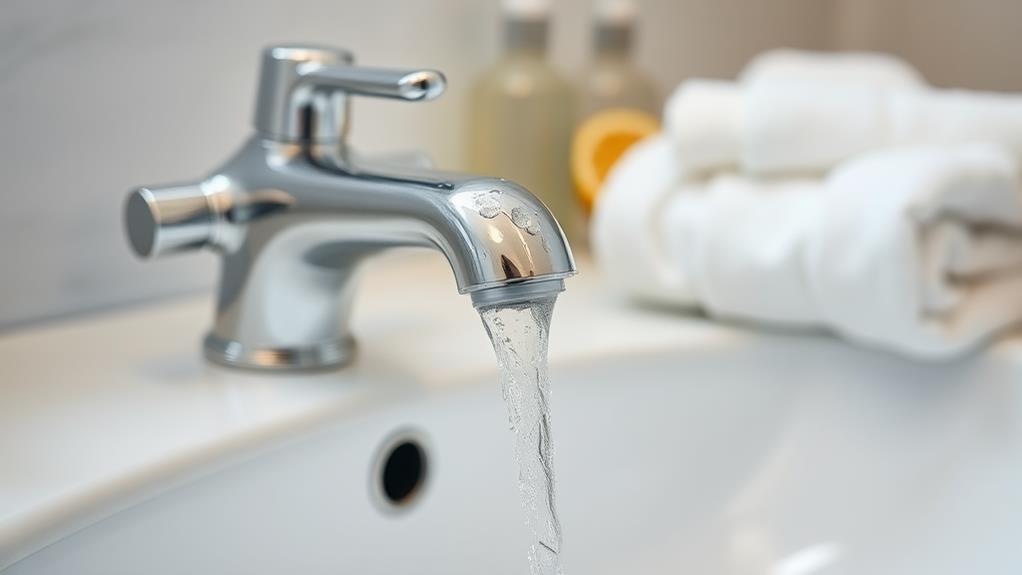






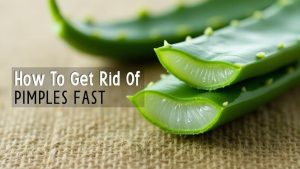



Post Comment